Decision Support

CER of Encounter Decision Aids for Early-Stage Breast Cancer
Faculty involved: Mary Politi
As a co-investigator on the PCORI grant and PI of the subaward from Dartmouth College, Dr. Politi aims to support women of low socioeconomic status through early-stage breast cancer treatment decisions by providing patients with point-of-care decision aids.
Child asthma exacerbation: Role of caregiver risk beliefs
Faculty Involved: Erika Waters, Jean Hunleth
Drs. Waters, Hunleth, and colleagues will used a mixed methods research design to gain in-depth understanding of the psychological and social factors that shape the decision making process that caregivers use to care for their asthmatic children. This project will provide evidence-based behavioral strategies to improve the lives of 6.2 million children who are affected by asthma.
Communicating Multiple Disease Risks
Faculty involved: Erika Waters, PhD, MPH
This study, Communicating Multiple Disease Risks: A Translation of Risk Prediction Science, translates epidemiological data about five major health consequences of insufficient physical activity into a visual display that conveys individualized risk estimates in a way that is understandable and meaningful to diverse lay audiences and motivates physical activity behavior.
Community Engagement in Research
Faculty involved: Mary Politi, Bettina Drake, Esther Lu, Aimee James, Jean Hunleth, Erika Waters, PhD, MPH, Vetta Sanders Thompson, Graham Colditz
This line of research strives to engage all members of the community throughout the research process to help navigate the healthcare process.
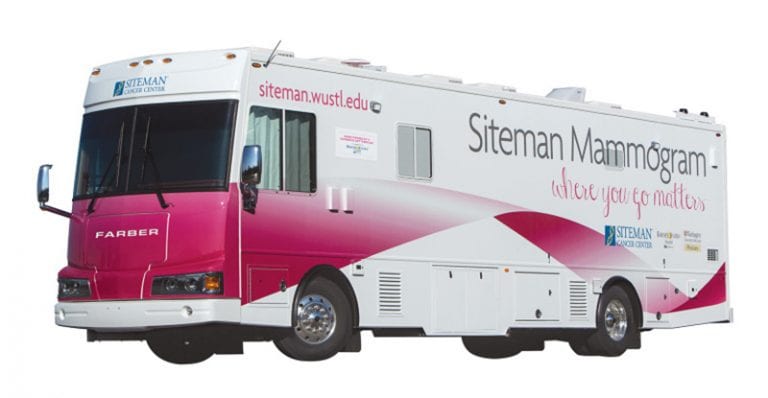
Community Outreach: Mobile Mammography Van
Faculty involved: Bettina Drake, Graham Colditz, Su-Hsin Chang
This project worked towards increasing and providing effective mammography screening for women in the St. Louis area.
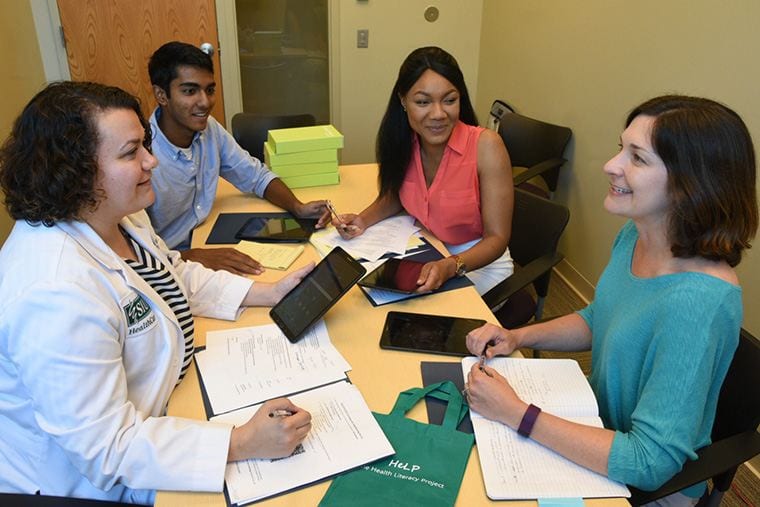
Health Literacy in the Context of Kidney Cancer & Smoking
Faculty involved: Erin Linnenbringer
This pilot project examined health literacy in the context of kidney cancer and smoking among rural populations in southern and central Illinois.
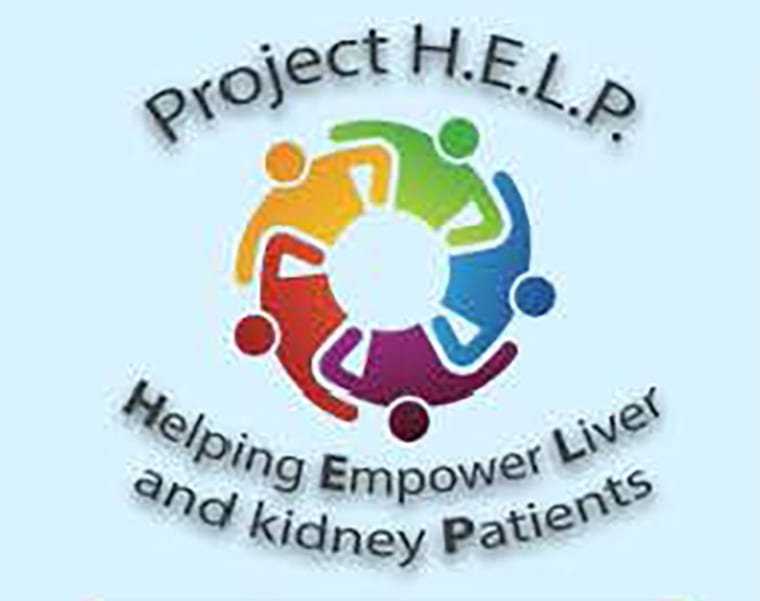
Informing Kidney Patients of Treatment Options
Faculty involved: Mary Politi
This project will develop tailored, patient-centered education materials to facilitate treatment decisions in patients with Hepatitis C infection and chronic kidney disease.
Optimizing Decision-Making about Breast Reconstruction after Mastectomy
Faculty involved: Mary Politi
This project will develop a preference-sensitive decision support tool for patients considering breast reconstruction after mastectomy. The tool will provide patient education, elicit patients’ preferences, and include personalized risk prediction to aid in the decision making process.

Prevention of Lower Urinary Tract Symptoms (PLUS) Research Network
Faculty involved: Aimee James, Siobhan Sutcliffe
The PLUS Research Network is a multi-site network designed to develop the evidence base for future clinical trials to prevent the development and progression of lower urinary tract symptoms in women and girls. Current projects include a qualitative focus group study, the development of new instruments to measure bladder health, systematic reviews of the literature, and analyses of existing study data to better understand bladder health and factors that contribute to the development and progression of lower urinary tract symptoms.
Program Evaluation of Community Engagement
Faculty involved: Aimee James, Graham Colditz, Vetta Sanders Thompson, Bettina Drake, Esther Lu, Jean Hunleth
Community-based participatory research (CBPR) helps give community members voice in academic research. These projects evaluated current and past CBPR projects to discovery future best practices.
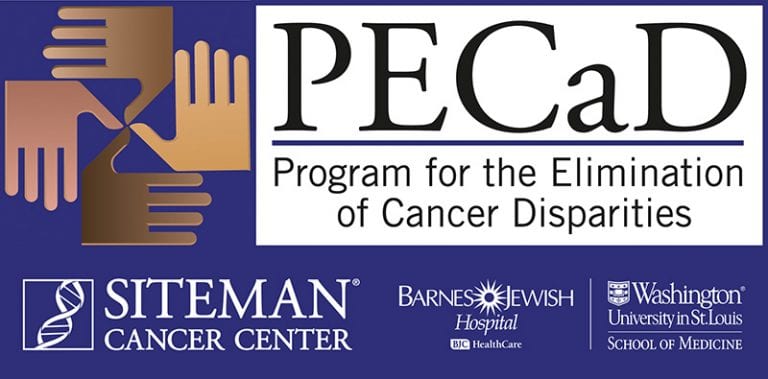
Program for the Elimination of Cancer Disparities (PECaD)
Faculty involved: Graham Colditz, Aimee James, Bettina Drake, Vetta Sanders Thompson
The mission of Siteman Cancer Center’s Program for the Elimination of Cancer Disparities (PECaD) is to create a national model for eliminating local and regional disparities in cancer education, prevention and treatment. Through a community advisory committee and community partnerships, PECaD works with community representatives to find solutions that reduce disparities.
Prostate Cancer Prospective Cohort
Faculty involved: Bettina Drake, Graham Colditz
The long-term goal of this collaboration between Dr. Drake and The St. Louis Mens Group Against Cancer is to be able to identify patients with increased risk for dying of prostate cancer while they are still treatable.
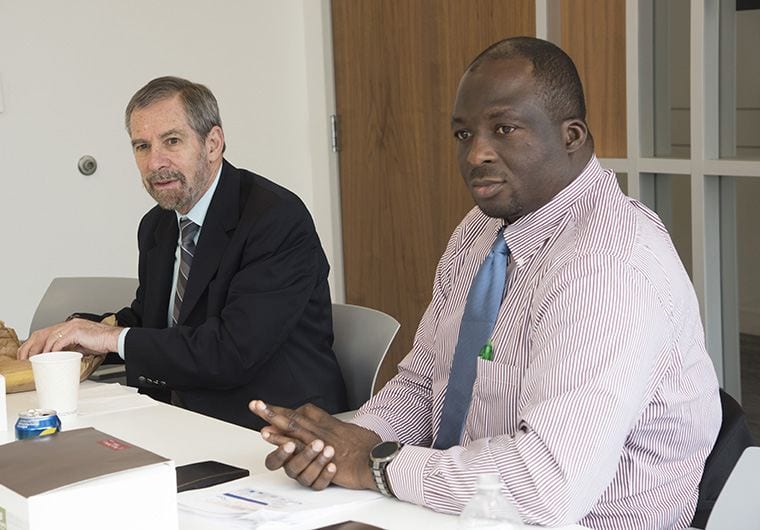
RANK Pathway and Mammographic Breast Density
Faculty involved: Adetunji Toriola, Graham Colditz, Rosy Luo
A very dense breast on mammogram is one of the strongest risk factors for breast cancer, and many women in the United States have extremely dense breasts. There is, however, very limited knowledge on how to modify breast density to reduce breast cancer risk
Supporting Cancer Patients Health Insurance Decisions
Faculty involved: Mary Politi, Aimee James, Esther Lu, Jean Hunleth
The goal of this grant from the American Cancer Society is to help cancer patients and survivors choose health insurance plans that best meet their health and financial needs. An existing decision support tool will be tailored based on patient interview data, and the modified tool will be evaluated with a 3-arm randomized trial.

Supporting Decisions About Cancer Clinical Trials in Rural Cancer Centers
Faculty involved: Mary Politi
This project will bring evidence-based decision tools to rural communities and attempt to support rural cancer patients’ participation in clinical trials.

Your Disease Risk
Faculty involved: Graham Colditz, Erika Waters, PhD, MPH, Adetunji Toriola, Bettina Drake, Siobhan Sutcliffe, Yikyung Park
Personalized health assessment tool that allows people to see their risk for common chronic conditions, such as diabetes, heart disease, stroke, and cancer risk.